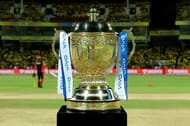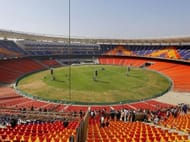
We are living in abnormal times. Nothing is what it used to be. Not even nostalgia.
Sport used to be all about the live action. And, few reactions around it. However, COVID 19 has locked the mankind to such an extent that live sporting action has disappeared from our television screens. Instead, the viewers are fed with the overdose of nostalgia; literally twenty-four into seven.
And, a little bit of how the athletes who used to thrive on the fields and packed stadiums are coping up with the lockdown. Earlier, the sports updates used to comprise of the wins and losses, scores, points and goals and records broken and made. For back to back weeks, sports updates became the events and tournaments which got postponed and cancelled one after the other.
All these had huge financial repercussions. The impact of which will be felt in the board rooms of the franchise, the meeting rooms of the federations, dressing room of the players, the board rooms of the sponsors and newsrooms of the sports broadcasters for months and years to come.
These abnormal times have made us realize as to how much we miss live sports. How much our personal and professional lives are woven around year-long sporting actions across the globe. The hours of training and amount of sacrifices put in by the players in bringing out their best on the field. The crucial role played by the sports broadcasters and their entire team in putting these images together and making them an intrinsic part of our abiding memories.
We had got so used to these that we had taken them for granted. The role of the sports bodies, federations and government agencies in keeping the entire sporting ecosystem alive. Often, they find themselves in the firing range whenever anything goes wrong. But, now when the pandemic has brought the entire sporting actions to the grinding halt, we are looking up to them to re-start the process.
Sportspersons are firm believers in fightbacks. Sports too will make a strong comeback. But, this comeback will be based on liquidating old and surplus inventories by all the major stakeholders of sports and focusing on select crucial stocks.
What is the extent of the loss caused by the pandemic?

The universal stock market of the sports industry has seen an unprecedented crash. The extent of economic loss may not be quantified before the pandemic gets over. However, there are a few broad indicators which give us an idea about the extent of the fall in the market.
The brand value of the Indian Premier League, which started in 2008, is estimated at $6.7 billion by the Duff and Phelps financial consultancy last year. IPL not only generates the major bulk of BCCI total revenue but as per a conservative estimate, brings about roughly $ 11 billion a year to the Indian economy.
The host broadcaster Star Sports paid more than $220 million per year on an average for five years of TV rights up to 2022. If the sources in Star Sports are to be believed, it was targeting around $400 million of revenue in 2020 alone. In all likelihood, T20 Cricket World Cup in Australia this September will be cancelled.
Instead, BCCI and host broadcaster Star Sports is mulling to use the window to organize IPL- in the worst-case scenario in the closed stadiums. As the Indian sporting ecosystem is dependent on IPL, world sporting universe is dependent on NBA and EPL- whose brand valuation is larger than the economies of many smaller countries.
With most of the international sporting events getting cancelled or postponed- many national boards and sports bodies have been forced into the cost-cutting. Cricket Australia has laid-off most of its staffs and is desperately looking at the extended tour of India to revive its fortune. England and Wales Cricket Board has announced pay cuts and is eying its series versus West Indies for the resumption of the international sporting action.
Football’s English Premier Leagues and Spain’s La Liga has seen players accepting wage cuts. The International Olympics Committee, on 14th May 2020, approved a financial package of up to USD 800 million to address the COVID 19 crisis.
The press release says;-“The IOC anticipates that it will have to bear costs up to USD 800 millions of its part of its responsibilities for the organization of Olympics Games 2020 (which had to be postponed to 2021) its extended operations and the support to the wider Olympic movement. This amount will be covered by the IOC itself; including any funding from the Olympic Foundation".
In a nutshell, from international Olympics committee, sports leagues and national sports bodies to the sports broadcasters -the pandemic has hit the stocks of all the stakeholders so hard in scale and size- that it has got no similar precedent in the past.
Are there any lessons for the leagues like IPL?

The Indian Premier League, in its journey of over the decade now, has had its share of challenges and learning. From its franchise being banned because of the conflict of interest to the entire edition being organized outside the country in South Africa as its window was clashing with the general elections in the country- the league has learnt its lessons a hard way.
Has the time not come for the stakeholders to liquidate some of its unnecessary inventories like extravagant opening ceremonies, overhyped players auction process and extravagant expenditure and invest on more substantive shares? The Wimbledon Championship which was cancelled for the year has been paying for the pandemic insurance are expected to be covered for this year.
As per a leading sports business analyst, Wimbledon could get 141 Million USD from its insurance cover. On the contrary, IPL has insurance against war and terrorism but not against the pandemic. Moreover, saving on the unnecessary heads will give it deeper pockets to meet similar unforeseen crisis in the future.
Will the pandemic change sports broadcasting forever?
In the complete absence of the live sports action, the leading sports broadcasters across the globe are facing an unprecedented crisis of content. They have tried to fill this gap with a two-pronged approach. Firstly, by taking the viewers on the trip down the memory lane- showcasing memorable matches and tournaments from its archive.
For instance, Star Sports showed complete all India versus Pakistan played in the different World Cups. The channels also showcased matches of inaugural T 20 World Cup in 2007 which was won by team India under the captaincy of MS Dhoni. Likewise, DD Sports showed the complete matches and highlights of the years leading to the making of the team India under Sourav Ganguly.
Secondly, discussions based shows with the players, former players and sports experts on the current situation and projections for the future. As in life, nostalgia has got tremendous value in sports. But, if it’s overdone, there is the threat of the medium finding disconnect with the other segment of the target audience. So, it has to be interspersed with the programming and sports which connects with other generations.
Almost on similar lines, a parallel trend has emerged in the digital medium and sports broadcast channels. From Mumbai to London and from Sydney to Chicago, we are increasingly getting to hear intricate parts of player’s life and real-life situations which could not have been possible in the normal times.

This includes Kevin Pietersen and David Warner discussing life and cricket with Virat Kohli and Rohit Sharma and Yuvraj Singh, Harbhajan Singh, Ashish Nehra, Mohammad Shami and Irfan Pathan amongst others discussing cricket and life beyond cricket with each other. In this, ‘Double Trouble’ shows spearheaded by two lead players of the Indian Women Cricket team- Smriti Mandhana and Jemimah Rodrigues deserves a special mention.
But, most importantly, the lockdown has led to numerous innovations from the production point of view. Many of them are going to stay in the years to come. For instance, BT Sport has taken the radical step of moving its entire production operation out of its studios at Queen Elizabeth Park, East London and turned it into a decentralized remote operation.
When the UK government, executed travel and social distancing restrictions, the channel moved quickly to be able to run its output with just five people working on location at its studio while every other member of the staff works from their homes.
This new at home-work culture protocol planned and implemented by them included, distributed way of working, staff having remote access to the main control room, all editing compliances, scheduling, access to the media management and all other allied activities required to run the network now accessible off-site.
Using this technical set up protocol, the channel produced seven live or nearly live topical shows per week. This includes, much talked about ‘Live UEFA CHAMPIONS LEAGUE + One year’, which is presented in the manner in the manner in which one gets the feeling that one is watching a live event. Many of these innovations are likely to stay and be the template for other channels to follow.
Sports broadcasting entailed high cost in terms of production and logistics. In a way, even before the pandemic, the management of these channels was looking at the ways and means to substantially cut the cost of production. The pandemic and the lockdown have shown as to how much could be done in terms of innovations in productions to bring the cost of production to the reasonable level.
So, tomorrow, when the pandemic is over, the financial managers of these channels are going to argue that if it was possible then, why most of these ideas could not be replicated in the future.
Also, if so much could be done from home, why to drag everyone to the office, particularly, in the crowded cities like Mumbai. As noted sports presenter and commentator, Alan Wilkins says-‘It will then boil down to the cost-benefit analysis. Decisions will then be taken in terms of how much online could be done without compromising on integrity and quality. ’
For the federations and government agencies like the Sports Authority of India- the pandemic has shown how much could be achieved in terms of online meetings, supervisions and follow-ups and conducting online sessions with the coaches, sports specialists and analysts.
Sports all set to kick start with these immediate innovations?

For a moment, visualize the newly built 1 lakhs 10 thousand plus capacity Sardar Patel Stadium in Gujarat. And, then think of one of the crucial IPL decider matches being played there in the closed stadium. Don’t be surprised, this can be the reality soon. The broadcasters all across the world are gearing up for the resumption of the live sporting actions in the closed stadiums.
And, then think about the bowler so used to using sweats and saliva to make the ball shine being prohibited from doing so? This may happen as a sports resume. And, then think of the fall of the wicket and players not hugging and falling over each other- because of the social distancing norms. And, the batsman hitting a century and waving bat to the empty stadium.
Sports broadcasters are gearing up to these situations. To avoid the monotony of the cut to the ground and cut to the player’s shots, they are thinking of miking up the players to break the monotony. Commentators take a kick out from the jubilations and eerie in the stands. They will have to innovate and improvise to fill up this gap. Our television screens may be yearning to get rid of the nostalgic matches now, but many of the practices which had become almost the routine are going to be nostalgia soon?
Get real-time updates on IPL 2025, live scores, IPL Prediction, match schedule, points table,Result & squad -CSK, MI, RCB, KKR, SRH, LSG, DC, GT, PBKS
